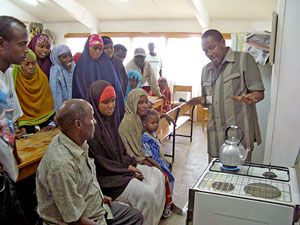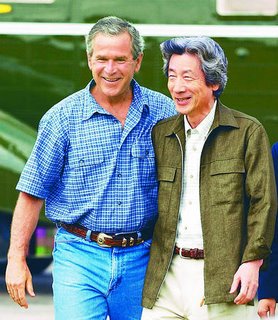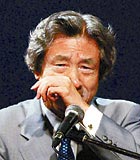 Strategies for handling a stress-filled life
Strategies for handling a stress-filled lifeCoach Beth Rothenberg responds to reader questions
MSNBC
As part of our Stressed Out! series, we asked readers to tell us what situations in their lives cause them the most stress. Then we took some of those questions to Beth Rothenberg, a life coach in Los Angeles. Below she weighs in with ways to cope.
WHERE'S THE FINISH LINE?
Q: I have so many home, child, work, self and husband responsibilities that I constantly feel like I'm behind, behind, behind. It's stressful always trying to catch up. It's like I'm running a race I can never win and there is no finish line. I don't blow up at work, but it seems like I'm always angry at home. What advice can you give me?
A: You're right, there's no finish line. And the solution isn't to figure out how to do it all, it's to figure out what to eliminate. Less is more! Are there responsibilities that your husband or kids could help with? Non-essential duties or volunteer activities that can be dropped? Can you afford to hire someone to clean your house or help with the laundry? Are there social commitments you'd like to cancel? Family members who intrude on your time, calling during dinner or while you're putting the kids to bed, for instance? Learn to set boundaries for the people in your life who create stress and anger and drain your energy. Learn to say "no" more often. Don't accept being overwhelmed. It's important that you take care of yourself — important for you and for the happiness and well-being of your family. You don't want them to bear the brunt of your anger. So make it a priority to take "me time" to get extra sleep, exercise and do things that you enjoy. I tell clients to create a "dessert menu" of all the little things that make them happy — maybe it's cooking, reading a book, soaking in the tub, making pottery, calling a girlfriend or getting a pedicure — and then indulge in one activity each day.
MONEY WOES
Q: Bills, bills, bills! When they start to pile up during the holidays I stress OUT. What should I do?
A: I'm a big fan of living below your income, not to it. What is the exact amount of money that you could spend that would not stress you out? Determine that amount and stick to it. Even make it a game and be really creative in how you can stretch a dollar. Keep in mind that one of the best gifts we can give to the special people in our lives is our time with just them, to do something you both love doing together. Think fun and way out of the box on this one, from the kids to that older special person on your list. People need to be hugged and listened to. Here's an amazing gift that's practically free: Take out some notepaper and write down your ideas. Then wrap it up, present it with a pretty bow and after the recipient opens in, decide on what you'd both like to do. For everything else holiday related, keep it simple, cheap and full of heart.
NO JOB SECURITY
Q: I don't know if the company I work for will be in business much longer. I have been looking for another job but have been unsuccessful for about two to three years now. I own a home and have a family, I don't know what I would do if I lost my job. What can I do to deal with this situation?
A: Not knowing is a big stressor. You feel like you don't have options, but you do; you just might not like what you think are your only options. I'd suggest creating an "emergency business plan" to help you deal with the stress and figure out just what your options are. In this plan, think first about the worst-case scenario — losing your job, not having an immediate job to replace it and all the other things that could go wrong as a consequence. What can you do now in case that happens and what would you do if it actually did happen?
For now, you could continue to look for other jobs, put together a list of contact you can network with, think about whether there are continuing education classes or other training that would improve your marketability. If you lost your job, think about what you would do if you couldn't find another job in the same field. What else could you do? What have you always thought you might want to do? This could be a wonderful opportunity, not a loss. Would you move? Once you've made your emergency business plan with all kinds of creative possibilities (ask for input and insights from others close to you), you'll feel like you're in control of your life and your stress will go way down. Coping is believing that you can manage what is stressing you. You are going to survive no matter what.
NOT REACHING GOALS
Q: I'm disappointed with where I am with the goals I set. I had goals for five years and 10 years, and although my professional goals are right on target, my financial security is not. I'm a nurse and I stress about working until I'm 70, which at this point is more reality than nonsense. I'm not enjoying my life. I detest the constant pressure to survive and force through huge roadblocks. Whatever happened to happily ever after? Is that just a fairy tale?
A: It's not just a fairy tale if you redefine happiness. Don't wait until you're 70 and retired for the happily ever after to start. You have to find what gives you happiness every day. If you don't pick the grapes, they dry on the vine. And if you don't turn the grapes into wine, you have nothing to party with! Celebrate your life all along the way. Live your life by design not default. It's important to think about your spiritual goals, which are the fuel for the happily ever after. Find what makes you truly happy in life and pursue it. Have fun! Make memories that will bring you pleasure as you get older. As for your concerns about financial security, take the bull by the horns and consult a financial planner who can help you manage your money into retirement.
SINGLE MOM BLUES
Q: I'm trying to get by being a single mother. I know I'm not the only one in this world. It just has never been this bad. I cannot keep up all my bills, buy groceries, diapers, pay the babysitter, etc., with a full-time job. Suggestions?
A: Looks like you're the "it" girl — that's the bottom line. The best way to get to the other side and find a sense of control in your life is to continue putting one foot in front of the other, but with one big adjustment. As busy as you are, it's important to carve out at least some time for yourself. What most women want is more peace and more time for themselves. But women's desires and dreams often are put on the backburner while they're taking care of everyone else. You need some downtime to take care of your wants and needs. So aim to claim at least a few minutes every day to take a "one-minute vacation" just to breath, to crank up the CD player and enjoy the music, to go out and bask in the natural sunlight or to do whatever it is that helps you relax. Ask yourself and focus on what is working in you're life and what you are grateful for. I'd also suggest some "girlfriend therapy." Make time to talk with some special and trusted friends about what's going on in your life and what your dreams are and how you could make them happen. And don't be afraid to ask for help from friends and family.
PROCRASTINATION
Q: Why do I procrastinate until I about have a mental breakdown! When I do complete the task I feel wonderful. What is that all about?
A: I've found that procrastinators often are perfectionists. They don't want to make the wrong decision, and so they don't make any decision. They think there is only one right road when often there are many right roads. Procrastinators also may drag their feet on a project because they need a mental break. Others are just plain stuck and need some help or advice to complete the job. Sometimes procrastinators put off big things in their lives because they really don't want them after all, and it's OK to move on if your goals have changed. Some people don't pursue their goals because they're afraid they'll fail. To help you deal with procrastination, make a master list of all the things you need to get done and start by ticking off the little ones (cleaning your closets, finishing a short report at work, mailing a package). You'll feel great to have some accomplishments under your belt. Then tackle the bigger projects and decisions.
TEEN TANTRUMS
Q: Dealing with the ever-changing emotions of two teenage daughters is very stressful. They are 17 and 14 and are like ticking-time bombs. My most pressing need with them is to have open dialogue and honest conversation, but they just shut down. How can I get through to them so that we can talk about issues like drinking, drugs and sex?
A: One of the things that matters most to teenage girls is to feel that they are being heard, and the way to connect with them is through trust. You can achieve that by listening more and talking (as in giving advice) less. "You should" messages will shut down the girls. Chances are the girls already know a good amount about drinking, drugs and sex, but you need to be there for them, to listen. Let them educate you about their concerns and assist them at their moments of crisis. Listening is a very powerful tool and I don't think parents use it that much. When you give others your full attention, that says you value them and that creates trust. Really listen and don't interrupt. Try the "seven-second rule" — when someone pauses don't jump in with a comment or advice, just allow for seven seconds of silence. This allows the person who was speaking to think more about what's just been said, without feeling rushed, and perhaps open up some more and finish the thought. Careful listening tells you what direction to steer the conversation and what questions to ask. Allowing the girls to talk more gives them the opportunity to realize they can actually be quite insightful about their own lives and can come up with some good answers. That said, teens do need boundaries. Don't allow them to yell or talk to you with their earbuds on. That's just rude and they need to show respectful manners. Above all, be there for your kids. We live in a fast culture and we have to create downtime and quality time for our children, moments where everyone can just relax and laugh.
© 2006 MSNBC Interactive
URL: http://www.msnbc.msn.com/id/15940563/













